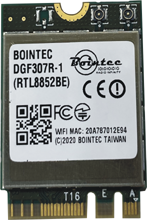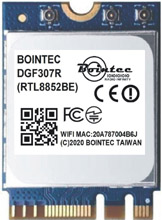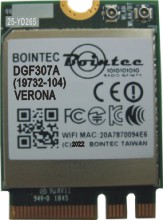
DGF307R
802.11abgn/AC/AX+BT5.2/5.0, 2T2R, M.2(2230), Realtek RTL8852BE
Bointec DGF307R IEEE 802.11 a/b/g/n/ac/ax PCIE WIFI with Bluetooth 5.2 combo M.2 module is a highly integrated single-chip MIMO (Multiple In, Multiple Out) wireless local area network (WLAN) solution to let users enjoy the digital content through the latest wireless technology without using the extra cables and cords. It combines a WLAN MAC, a 2T2R capable WLAN baseband, and RF in s single chip. It enables a high performance, cost effective, low power, compact solution that easily fits onto the PCI Express and USB M.2 module.
Bointec DGF307R baseband implements Multi-user Multiple Input, Multiple Output (MU-MIMO) Orthogonal Frequency Division Multiplexing (OFDM) with two transmit and two receive paths (2T2R). Features include two spatial stream transmissions, short Guard Interval (GI) of 400ns, spatial spreading, and support for variant channel bandwidth.
Moreover, Bointec DGF307R provides one spatial stream space- time block code (STBC), Transmit Beam forming (TXBF) and Low Density Parity Check (LDPC) to extend the range of transmission. At the receiver, extended range and good minimum sensitivity is achieved by having receiver diversity up to 2 antennas. As the recipient, DGF307R also supports explicit sounding packet feedback that helps senders with beam forming capability.
| Wi-Fi | |
| Standard | IEEE802.11ax, IEEE802.11ac,IEEE802.11a , IEEE802.11b , IEEE 802.11g , IEEE 802.11n |
| Bus Interface | PCI Express |
| Data Rate | 802.11b: 1, 2, 5.5, 11Mbps |
| 802.11a/g: 6, 9, 12, 18, 24, 36, 48, 54Mbps | |
| 802.11n (HT20): MCS0~MCS7(1T1R_SISO) 6.5~72.2Mbps; | |
| 802.11n (HT20): MCS8~MCS15(2T2R_MIMO) 13~144.4Mbps; | |
| 802.11n (HT40): MCS0~MCS7(1T1R) 13.5~150Mbps; | |
| 802.11n (HT40): MCS8~MCS15(2T2R) 27~300Mbps; | |
| 802.11ax (HE_MU,26~242RU): MCS0~MCS11(1T1R) 0.4~143.4Mbps; | |
| 802.11ax (HE_MU,26~242RU): MCS0~MCS11(2T2R) 0.8~286.8Mbps; | |
| 802.11ax (HE_SU, non-OFDMA 20MHz): MCS0~MCS11(1T1R) 3.6~143.4Mbps; | |
| 802.11ax (HE_SU, non-OFDMA 20MHz): MCS0~MCS11(2T2R) 7.3~286.8Mbps; | |
| 802.11ax (HE_SU, non-OFDMA 20MHz): MCS0~MCS11(1T1R) 3.6~143.4Mbps; | |
| 802.11ax (HE_SU, non-OFDMA 40MHz): MCS0~MCS11(1T1R) 7.3~286.8Mbps; | |
| 802.11ax (HE_SU,non-OFDMA 40MHz): MCS0~MCS11(2T2R) 14.6~573.5Mbps; | |
| Media Access Control | |
| Modulation Techniques | DSSS, OFDM, DBPSK, DQPSK, CCK, 16-QAM, 64-QAM for WLAN |
| Network Architecture | |
| Operation Channel | 2.4GHz: |
| USA, NORTH AMERICA, Canada and Taiwan – 1 ~ 11 | |
| China, Australia, Most European Countries – 1 ~ 13 | |
| Japan – 1 ~ 14(CH14 only for 802.11b) | |
| 802.11g: | |
| USA, Canada and Taiwan – 1 ~ 11 | |
| China, Australia, Most European Countries – 1 ~ 13 | |
| 5GHz: | |
| USA, EUROPE – 36, 40, 44, 48, 52, 56, 60, 64, 100, 104, 108, | |
| 112, 116, 120, 124, 128, 132, 136, 140, 149, 153, 157, 161, 165 | |
| Frequency Range | 2.4 GHz : 2.412 ~ 2.484 GHz |
| 5 GHz: 4.915 ~5.925Ghz | |
| Security | WAPI |
| WEP 64-bit and 128-bit encryption with H/W TKIP processing | |
| WPA/WPA2 (Wi-Fi Protected Access) | |
| AES-CCMP hardware implementation as part of 802.11i security standard | |
| Bluetooth | |
| Standard | Bluetooth 2.1+Enhanced Data Rate (EDR) + BT4.2+BT5.2 |
| Bus Interface | USB2.0 |
| Data Rate | Bluetooth 2.1+EDR data rates of 1,2, and 3Mbps |
| Modulation Scheme | GFSK (1Mbps), Π/4 DQPSK (2Mbps) and 8DPSK (3Mbps) |
| Frequency Range | 2402~2480MHz |
| Transmit Output Power | Class 2 : 0~6 dBm |
| Receiver Sensitivity | GFSK: -88 dBm (Typical) |
| π/4-DQPSK: -89 dBm (Typical) | |
| 8-DPSK: -83 dBm (Typical) | |
| Software | Bluetooth Suite |
| Electronics characteristics | |
| Operating Voltage | 3.3 V |
| OS Supported | Microsoft Windows |
| Antenna Type | I-PEX MHF4 Connector Receptacle (20449) |
| CH1 : Wi-Fi à TX/RX | |
| CH2 : Wi-Fi à TX/RX | |
| CH3: Bluetooth à TX/RX | |
| Environmental | |
| Operating Temperature | Commercial: 0°C ~ +70°C |
| Storage Temperature | Commercial: -40°C ~ +85°C |
| Operating Humidity | Operating humidity: <85% |
| storage humidity: <60% | |
|
Country |
Certification |
|
EU |
CE |
|
USA |
FCC |
|
Canada |
IC |
|
Japan |
TELEC |
|
Korea |
KCC |
|
Taiwan |
NCC |








